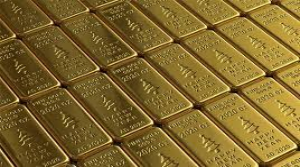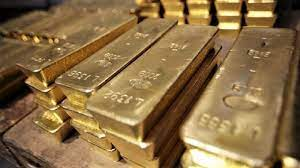Last week, spot gold continued to fluctuate within a narrow range, closing at $1,843.10 an ounce, as the market's growing concerns about the slowdown in global economic growth stimulated the safe-haven demand for gold. This week, investors need to pay attention to the minutes of the Federal Reserve's May monetary policy meeting and keep an eye on changes in the geopolitical situation.
Recession expectations grow
Recently, what has been most panicked by the market is undoubtedly the weak performance of multiple sets of US economic data. The U.S. Department of Labor previously released a report showing that the number of initial jobless claims increased by 21,000 to 218,000 in the week ended May 14, the highest since the week of January 22 this year. The market expected 200,000 people. The figure could indicate that labor demand is starting to slow amid tightening financial conditions.
Compared with the unexpectedly weak employment data, the subsequent regional manufacturing data was undoubtedly more surprising. The data shows that the U.S. Philadelphia Fed manufacturing index recorded only a pitiful 2.6 in May, a new low since December 2020, a sharp drop from the previous value of 17.6. The Philadelphia Fed manufacturing index is the earliest regional manufacturing index released in the past month. For one, the sharply weaker-than-expected data in May reflected that the manufacturing heat in the mid-Atlantic region of the United States is fading.
Affected by the weak performance of the above-mentioned multiple U.S. economic data, the market has become increasingly worried about the prospects of the U.S. economy. In the face of growing concerns, if the U.S. economic contraction accompanied by the continued strengthening of the dollar hinders the development of all areas including employment and trade, this kind of failure to take Attitudes to measures may change. A Bloomberg survey of economists put the chance of a U.S. recession next year at 30 percent, the highest since 2020.
Markets have recently started a big debate about whether central banks need to trigger a recession to force inflation lower.
Some people believe that such action is unnecessary, because "the antidote to high inflation is high inflation." There's some truth to this: Consumers around the world are already facing a sharp drop in real incomes as wages fail to keep up with rising prices; as real incomes fall, inflation will cool.
But if real incomes can drive the inflation cycle, we don't need monetary policy. The whole reason a policy-induced recession is needed is that real incomes won't reduce inflation unless labor market conditions ease, and from that perspective, a recession seems inevitable, and gold prices will see huge swings in such a storm.
The dollar can't go up?
The U.S. dollar index is up about 8% since the start of the year, and the dollar’s “safe-haven” risk premium is now at an “extreme ceiling” even when factoring in interest rate differentials.
Previously, the U.S. dollar hit a nearly 20-year high last week, the Fed's hawkish stance, the rise in safe-haven demand since the conflict between Russia and Ukraine, and the better performance of the U.S. economy relative to those in Europe and other countries have all brought a boost.
The euro had previously hovered around $1.0576 per euro, a steady decline from around $1.22 in June last year, the first time the euro has been close to parity against the dollar in 20 years.
This is also caused by differences in monetary policy among central banks. The U.S. central bank raised its benchmark interest rate by 50 basis points earlier this month, the second rate hike this year to rein in inflation at a 40-year high.
In stark contrast to the Fed and the Bank of England, the European Central Bank has been slow to raise interest rates despite record inflation in the euro zone. But at a recent news conference, Bundesbank President Nagel, the European Central Bank's governing council member, said he expects the ECB to raise interest rates in July, with further hikes likely to follow, and Morgan Stanley expects the ECB to raise rates. Exit negative rates in September this year and raise rates twice in 2023.
How the Fed will respond
If two trains are moving towards each other at different speeds, when will they collide?
The Federal Reserve applies the principles of this elementary school math problem in the execution of monetary policy.
Against this backdrop, one train represents the aggressive tightening plan announced by the Federal Reserve, while the other represents the U.S. economy, which, while still strong, is showing some signs of cooling.
The Fed has a dual mandate to ensure full employment and price stability. Historically, the Fed has changed the federal funds rate based on changes in unemployment and inflation. Simply adding up these changes is a good indicator of changes in Fed policy. This relationship has been going on for decades so far.
Over the past year, there has been a stark divergence between the Fed's monetary policy and the relationship between unemployment and inflation. Faced with a sharp drop in unemployment and a sharp acceleration in inflation, the Fed failed to move quickly. The reasons for the Fed's sluggish action are mainly concerned with the impact of the epidemic and their previous wait to see whether inflation is temporary.
At present, the Fed's monetary policy has seriously lagged behind the curve of unemployment and inflation in the above chart, and it has to "quickly" raise interest rates by 50 basis points to control inflation expectations and protect its reputation. The Fed seems to be ready to install Raising interest rates to around 3.5% next year will see inflation slow further and unemployment largely level off. Tighter monetary policy will have an increasing impact as the Fed continues to raise interest rates and over time
Wall Street investment banks believe that before raising interest rates to 3.5%, excessive interest rate hikes by the Federal Reserve will lead to the risk of financial accidents and economic recession. This unsynchronized, tightening stance of monetary policy will slow the cyclical economy and lead to a recession as early as the second half of next year. Given this conflict between the Fed and a cooling economy, long-term interest rates are likely to be near their peaks.
The Fed has been talking about tackling inflation recently, but in reality, the Fed has not done much. According to the latest data, the Fed's balance sheet has expanded by another 2%. This is undoubtedly adding fuel to the fire of high inflation. Under the high inflation environment, the price of gold may usher in a turnaround.
 2022-05-23
2022-05-23
 1055
1055






 简体中文
简体中文
 ภาษาไทย
ภาษาไทย
 繁體中文
繁體中文
 Indonesia
Indonesia











